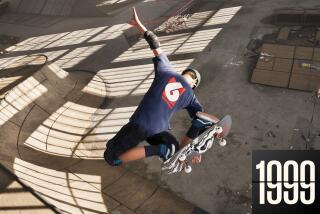From New Age to Space Age : Local Offerings Include Dan Crary Probing Fresh Ground and Vandals Joking on ‘Punk Planet’
With the year fast slipping away, we’ll try to catch up on some recent album releases from Orange County-based artists. The ratings system ranges from (poor) to (excellent). Three stars is a solid recommendation.
*** Dan Crary “Thunderation” (Pamlico Sound/Sugar Hill)
They ought to post signs wherever this Fullerton-based musician sets up to play: “Attention, master guitarist at work.”
Starting from a strong folk-bluegrass foundation, Crary has made a habit of taking his guitar in unexpected directions: his four previous solo albums have incorporated Celtic, classical and flamenco strains. This time, Crary brings along all those influences while stepping into the New Age.
It’s a development that might give pause at first. On his folk-bluegrass releases, Crary has surrounded himself with such ace accompanists as fiddler Byron Berline, banjo man Bela Fleck and mandolinist Sam Bush. On the all-instrumental “Thunderation,” produced by Billy Oskay of the New Age group Night noise, Crary’s acoustic six- and 12-string guitars keep company on several tracks with drum machines and synthesizers.
They make for fairly dull company, at that. The computer percussion, used on three songs, is stiff and anemic. A real drummer might have jostled and prodded Crary’s steaming, streaming guitar lines, fortifying the drama inherent in “Banderilla” and “West O’ the Moon”--songs that sound like scenes from an unmade, epic Western (“Song of the Makoraka-O” is yet another installment in what amounts to a Great Plains trilogy).
But Crary is not a guitarist who needs prodding. His playing is restless, kinetic, honed with a gleaming, probing edge. On “Thunderation,” it reaches rocking propulsion. With his guitar eating up terrain like a train traversing an open landscape with an endless vista, Kansas native Crary recalls the feel of early albums by another Midwesterner, Pat Metheny. The traditional “Lady’s Fantasy” harnesses that drive in a British folk context in which Crary’s hammering bass notes and plangent chords serve as springboards for guitar runs of astonishing speed and accuracy. A balancing lyricism emerges on such sad, wintry ballads as “Amsterdance” and “Denouement.”
The New Age tag may apply to the clean, sleek production on “Thunderation.” But the strength of the compositions and the intensity of the playing make the album anything but an aural cushion for the comfortably mellow.
** 1/2 The Vandals “Fear of a Punk Planet” (Triple X)
As long as the Vandals are around, there is no need to fear a totally serious planet. The band, now completely revamped from its original 1981 lineup, exists primarily to send up everything it sees.
The latest version of the Vandals is the most potent, with Warren (Mutant Boy) Fitzgerald, formerly of Gherkin Raucous, supplying frenzied metal-razor guitar, and drumming Wunderkind Josh Freese pumping up the beat (Devo’s Bob Casale is the producer). Bassist Joe Escalante and singer David Quackenbush are the holdovers from 1988’s country-punk-funk fusion album, “Slippery When Ill.”
With Fitzgerald and Freese on hand, the Vandals even muster enough thrust to do a decent Suicidal Tendencies punk-metal knockoff on “Hey Homes!” (with guest lead guitar from Dweezil Zappa).
The Vandals aren’t ones to observe political correctness. “Girls Turn 18 Every Day” and “Summer Lovin’ ” (with guest vocals from Moon Unit Zappa) both joke about men using and discarding women. But with antics like the military-drill cadence he uses on “Girls Turn 18,” Quackenbush makes it clear that none of it is meant to be taken seriously.
“Kill My Tenant” is another scattershot satire more intent on wisecracking than on taking sides. The song draws a mocking, stereotypical portrait of welfare-recipient tenants ruining the landlord-narrator’s property and holding out on the rent.
But the narrator is also a target of the spoof who dreams of regaining the exploitative prerogatives landlords enjoyed in the Dark Ages: “How I long for medieval times, (when the) right to deflower virgins was mine/No coalitions telling me what to do, no pesky pinko ACLU.”
Other songs get joking mileage out of celebrity death-cults and murder-conspiracy theorists (“The Day Farrah Fawcett Died”) and video games (“Join Us for Pong,” in which the Vandals hail Nintendo players as rebel souls because they’re turning off the System personified by commercial television and using their TV sets for a higher purpose).
“Pizza Tran (She Delivers)” may be the first rock song to take notice of Orange County’s Vietnamese community. Quackenbush sweetly professes his love for an immigrant pizza-delivery girl named Tran--albeit with a streak of typical Vandals irreverence-bordering-on-crudeness: “Two long weeks in that little leaky boat, just to get the right to see me and to vote.”
This is no band for listeners of refined sensibilities who want artistry and illumination in music. But the Vandals will probably yield a few chuckles for those willing to grant them their indiscriminate silliness and play along.
** Big Drill Car “Batch” (Cruz)
On its third release, Big Drill Car continues to rev a mighty engine, but where the songwriting and arranging are concerned, the band is just spinning its wheels.
There is no denying the clean, unrelenting crunch that guitarist Mark Arnold, bassist Bob Thomson and drummer Danny Marcroft achieve as they find hard-rocking middle ground between Led Zeppelin and Husker Du. If these college-radio rockers were college football players, they’d be All-American linebackers.
While the band’s ability to rock at will makes “Batch” listenable throughout, sameness sets in over the course of the album, one song blurring into another.
That problem also beset the band’s 1989 release, “Album Type Thing,” which is pretty much interchangeable with “Batch.”
Except for the closing song, “Faster,” which, paradoxically, is taken at a slow gait, Big Drill Car rolls at racing tempos. Each song has a melodic hook--but the bait always seems to be the same: an undulating singsong delivered by Frank Daly, whose voice is tuneful enough, but thin. Good backing vocals could lend needed support, fill out the band’s sound, and perhaps offer counterpoint to BDC’s one-directional thrust. But they are almost nonexistent.
Daly’s lyrics try to sort through the confusion of post-adolescence without unseemly whining. But the words race by too rapidly, delivered with too little variation in tone or expression, to paint a vivid picture.
Big Drill Car’s ability to rock well counts for a lot, but the band needs a fuel-injection of new approaches and fresh ideas.
** Tuxedo Cowboy “Woman of the Heart” (Audioquest)
Much of the material on this debut album is lovely, as singer-songwriter Debra Anne Bishop tells psychologically attuned stories of women struggling to trust their hearts and open themselves to committed love. The problem is that Debra Anne (her performing name) sometimes seems unwilling to trust her songs. Given simple, direct readings, the songs’ winning melodies and involving situations would have hit home. Instead, the performances tend to be formal and overdrawn in a way that detracts from the songs.
Halting cadences, breathy phrasing, and a too-ready resort to crying, catch-in-the-voice mannerisms undermine several songs. “It Took More Love,” in particular, is a potentially affecting character study that comes across as painfully slow, stilted melodrama.
With its unusual lineup of flute, cello and guitar, Tuxedo Cowboy essentially plays art songs with a trace of a folk and country accent. Flutist Greg Bishop (Debra Anne’s husband) and cellist Steve Velez play some very pretty airs, notably on the instrumental “Debra Anne.” What’s missing is a strong rhythmic element to anchor those smooth, sweet flights and lend the music toughness and bite. Lacking that, the effect can be cloying. Debra Anne’s placid guitar strumming is too tame for the purpose; the band might have done well to add a guitarist who could play lead parts and firm rhythms.
Debra Anne’s dramatic approach works well on “I Am Homeless,” a Brechtian monologue that supports her hushed theatrics. Elsewhere, she tries to oversell songs that would sell themselves if she just let them flow. “Cold Hearted Blue,” “He Loved Her Then” and, especially, “Woman of the Heart” all have the emotional weight and melodic beauty to work without the vocal equivalent of a magic marker underscoring them.
Tuxedo Cowboy has done better by its songs in live performance. This isn’t the first time a band has tried too hard and lost some of its natural appeal under the pressure of making its first album.
More to Read
The biggest entertainment stories
Get our big stories about Hollywood, film, television, music, arts, culture and more right in your inbox as soon as they publish.
You may occasionally receive promotional content from the Los Angeles Times.











